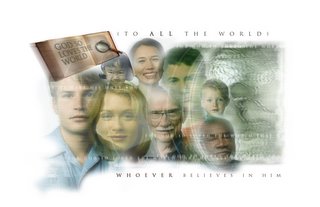
Giving Yourself Away…
So, for this class I have been watching a lot of movies that, according to the prof, illustrate a “postmodern milieu,” whatever that means. So between Blade Runner, What Dreams may Come and The Matrix a theme seems to have arisen that is being played out in this type of movie…giving yourself away.
Then I started skimming through my favorite author of late, Dean Koontz, and started seeing a similar theme. That it is through the primary characters self-giving and sometimes self-sacrifice, that the ultimate good is accomplished. That life is not fully lived if only lived for self. There is more out there than can be seen or even imagined and it is only revealed when you are willing, even desiring, to live beyond the now and live into the future.
What is it that is worth living, or even dying, for? Will we give ourselves away so that others can fully live? So that we can fully live?
Self-sacrifice is the cost of real relationship. Now by self-sacrifice I do not mean it in some self-demeaning, accepting abuse way. I mean that the willingness to live beyond the me and embrace both micro-community of accountable relationships and macro-community of larger relationships. We live interwoven into each other’s lives, realizing that we are changed and molded by every relationship and that in those relationships we are given the opportunity to live Christ.
Isn’t this the way Christ teaches us to live? The life with the shadow of the cross ever before us. Jesus illustrated that to live fully is to embrace the cost of life. I pray that I can live the kind of life that is lived fully and that I live until I die! I can only do this if I remain:
Lost in Grace,
Marty
Gracious God, grant me the ability and desire to live and die in your presence and for a purpose far greater than my own. In the name of the One who died that we might live, I pray. Amen.




